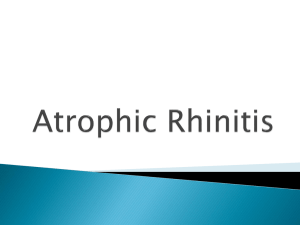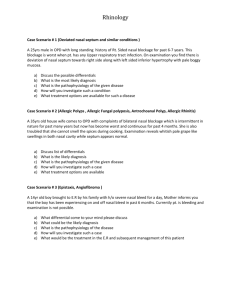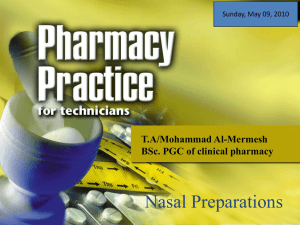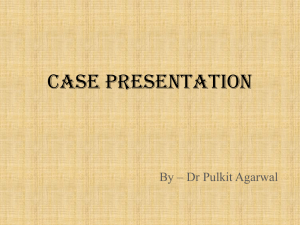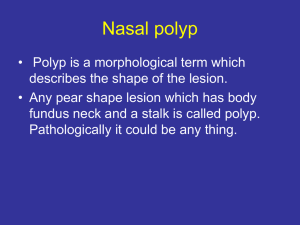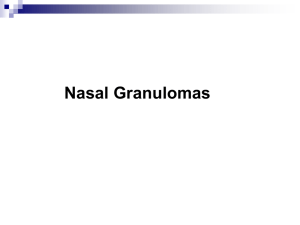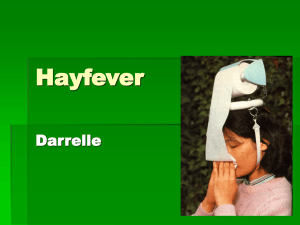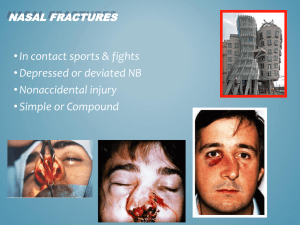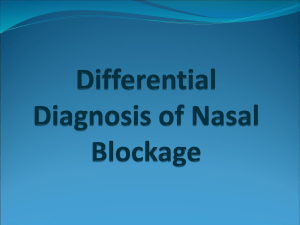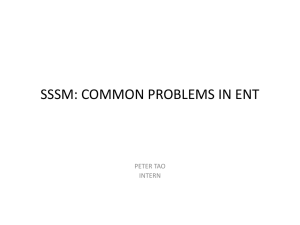Treatment
advertisement
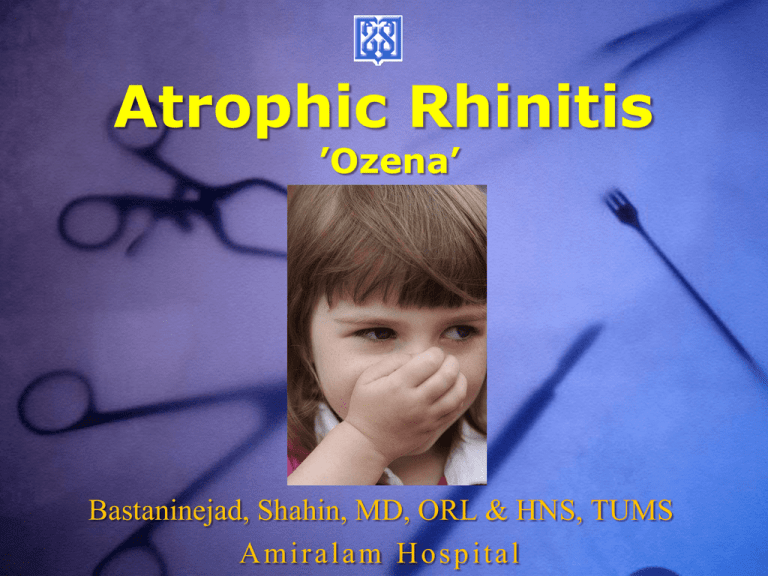
Atrophic Rhinitis ’Ozena’ Bastaninejad, Shahin, MD, ORL & HNS, TUMS Amiralam Hospital Presentation Outlines Definition Pathophysiology Clinical presentations Differential diagnosis Investigations Treatment Atrophic rhinitis (AR) is a chronic and degenerative disease of the nasal & paranasal mucosa & other structures Definition (Cont’) triad of characteristic fetor, greenish crusts and roomy nasal cavities this triad is diagnostic of the condition Prevalence of Primary AR 0.3-1% in high prevalence countries High Prevalence countries are: India, Pakistan, China, Philippines, Malaysia, Saudi Arabia, Egypt and South america Definition (Cont’) Primary AR: More common in females(*6), usually bilateral, Prevalent in young and middle age adults Often, no underlying etiology is discovered, although inheritable or infectious causes (58.7% K. ozena) are proposed mechanisms there is however little evidence to suggest bacterial organisms cause the disease, they may be secondary invaders Definition (Cont’) Secondary AR: Complication of sinus surgery (89%) 1. FESS in CRS > FESS in Polypoid CRS 2. In Mayo clinic assay : Partial MT and/or IT resection was the most common cause Complication of radiation (2.5%) Following nasal trauma (1%) Sequela of granulomatous diseases (1%) and other infections : TB, Sarcoidosis, Leprosy, Rhinoscleroma, Syphilis Outlines Definition Pathophysiology Clinical presentations Differential diagnosis Investigations Treatment Pathophysiology Nl. Respiratory epithelium (Pseudostratified Columnar) metaplastic changes cuboidal/stratified squamous epithelium Atrophy of cilia and the mucosal and submucosal gland Secondary bac. Infection produce a foetid odour Osteitis of inferior turbinates and ethmoid turbinates Vascular involvement (mainly endarteritis obliterans) Outlines Definition Pathophysiology Clinical presentations Differential diagnosis Investigations Treatment Clinical Features (Symptoms) Nose emits a foul smell due to crusting and secondary infections (main characteristic). Anosmia, cacosmia Nasal obstruction Headache Thick purulent discharge with a foul smell (due to the anaerobic bacteria) Minor bleeds due to dislodgment of crusts Complain of dryness in the nose and throat (pharyngitis sicca) Clinical Features (signs) Greenish yellow and black crusts (Crusts 100% present), bleeding and ulcerated mucosa is seen when crusts are separated Patient is usually gloomy Foetor (detected from distance) Wide capacity of the nasal passages, Shrinkage of inferior and middle turbinates Insensitivity of nasal mucosa (probe test) Septal perforation, myiasis, saddle nose &… may be seen Outlines Definition Pathophysiology Clinical presentations Differential diagnosis Investigations Treatment Differential diagnosis TB Leprosy Scleroma Syphilis Chronic sinus suppuration on its own Suppurating adenoidal disease Neglected FB / rhinoliths Kern & Wegner’s disease Stenkvist at 1994 Chronic fungal rhinosinusitis Empty nose syndrome (ENS) What is ENS? ENS is an iatrogenic disorder most often recognized by the presence of paradoxical nasal obstruction despite an objectively wide nasal fossa ENS vs. Secondary AR The resorption of the turbinate and adjacent mucosal tissue that results from atrophic rhinitis is reflective of the underlying pathophysiology of the disease, whereas ENS is an iatrogenic disorder Secondary AR may also be the result of a multitude of other factors, including trauma, infection, or immunologic disorders. Atrophic rhinitis has clear pathogenic links to organisms isolated from nasal cultures, but as of yet, there is no pathogen associated with ENS Outlines Definition Pathophysiology Clinical presentations Differential diagnosis Investigations Treatment Investigations Hematologic study (CBC/diff) ESR FBS C-ANCA, VDRL PPD CXR PNS CT-Scan Nasal swab for culture Nasal Bx tested for bacteriological and morphological indices Outlines Definition Pathophysiology Clinical presentations Differential diagnosis Investigations Treatment Treatment (Medical) Conservative management is the mainstay of the treatment No cure available Decongestants or antihistamines: strongly contraindicates Nasal irrigation and douches: With Alkaline douches (preferred) With N/S or antibiotic+N/S douches Treatment (Medical) An ideal alkaline nasal douche mixture: 1. Sodium bicarbinate 25g 2. Sodium biborate 25g 3. Sodium chloride 50g One teaspoonful of this mixture in 250cc lukewarm water, tds or qid, for 6wk, with a 10 to 20cc syringe Instruct the patient to bend forward during the procedure and keep saying K K K… Treatment (Medical) Glucose-glycerine nose drops 1. Anhydrous Glucose 25% (~15g) 2. Glycerine 60cc Use this after nasal douching You can also Chloramphenicol douching, too use drops Gentamicin after or nasal Treatment (Medical) Antibiotics: Rifampicin 600mg daily for 12wk (generic cap. is 300mg – take 2 every morning) Recently: Cipro 500-750mg bid for 1-3mo Vitamin A , 12,500 IU/day up to two weeks. Iron supplements (if the patient is anemic) Treatment (Surgical) 1) Young’s Procedure 2) Modified Young’s procedures 3) Modification of modified Young 4) Implantation 5) Other approaches Treatment (Surgical) Young’s procedure Circumferential flap elevation 1 cm cephalic to the alar rim Complete closure of nostril Staged second side in 3-6 months Difficult to elevate circumferential flap Modified Young Staged second side with first side takedown in 6 mo No vestibular stenosis on takedown Treatment (Surgical) Modification of the modified young’s: Treatment (Surgical) Implantation: uses (Auto/homografts), Bone Cartilages, ... Prostethic implants such as Plastipore, ... Extrusion of the prosthetic implants occured 1 in 8 in Plastipore series, but in another prosthetic series it was occured as high as 80% Plastipore Silastic Sheet - Case: Primary AR - 12mo postop result (Otolaryngology–Head and Neck Surgery (2010)) Right Left Treatment (surgical) Other approaches: Transferring the Stensen duct to the maxillary sinus antrum Using a caldwell approach, translocating the lateral nasal wall more medially Silastic obturator ... Presentation Conclusion Endoscopic Sinus Surgery 2nd Atrophic Rhinitis Primary Atrophic Rhinitis Functional Endoscopic Sinus Surgery ...Try to save nasal structures and mucosal layer as much as you can
